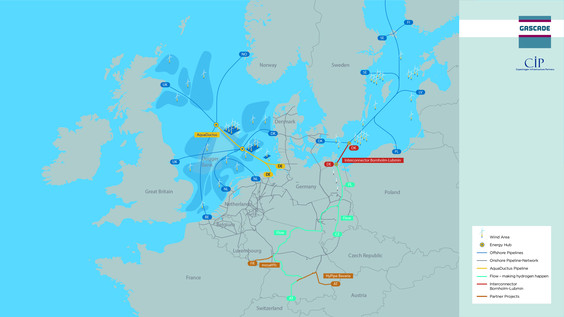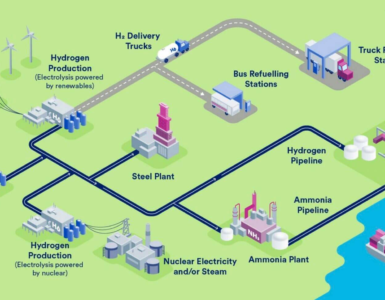Hydrogen pipeline planned through the Baltic Sea – 140km pipeline between Germany and Denmark.
German-Danish cooperation project aims to realize 140-kilometer pipeline connection from Bornholm to Lubmin with import capacity of up to 10 GW
H2 Interconnector Bornholm-Lubmin is scheduled to bring hydrogen from the Danish island Bornholm to Lubmin from 2027. The cross-border hydrogen infrastructure aims to support and enhance an accelerated development of offshore wind in the region and wider Baltic Sea, while securing a reliant and cost-efficient decarbonization pathway for the north-eastern European energy system.
The project is being developed by GASCADE together with Copenhagen Infrastructure Partners’ (CIP) dedicated CI Energy Transition Fund as a potential financial investor. The Danish transmission system operator Energinet is also involved in the project. A PCI application has been submitted to the European Commission for the 140-kilometer interconnector.
🔥 What about we co-host a webinar? Let's educate, captivate, and convert the hydrogen economy!
Hydrogen Central is the global go-to online magazine for the hydrogen economy, we can help you host impactful webinars that become a global reference on your topic and are an evergreen source of leads. Click here to request more details
The offshore pipeline, for which a feasibility study has already been carried out with positive results, is intended to connect the island of Bornholm and the offshore wind farms around it with the German Baltic Sea coast close to Lubmin. There, the hydrogen is fed into the onshore infrastructure and transported further south. The pipeline will be dimensioned to be future ready with an incremental capacity increase towards 10 GW in the 2030’s.
This makes the adjacent Project Flow – making hydrogen happen even stronger and more European. With a length of over 1,100 km and an entry capacity of up to 20 GW in the final stage, this project has large dimensions right from the beginning. The newly built interconnector extends the new hydrogen highway, which will connect Denmark with several large hydrogen demand centers in Germany.
Christoph von dem Bussche, GASCADE Managing Director on behalf of those responsible for the project, said:
In this way we support the climate targets for 2030 and ensure that Germany and Europe can supply themselves with hydrogen produced in Europe.
The Baltic Sea holds a significantly untapped potential which can contribute to increased energy security as well as the European Union’s 2030 targets for energy and climate and its 2050 climate neutrality objective.
Karsten Plauborg, Partner at CIP, said:
- The Baltic Sea is a powerhouse of wind energy, and Copenhagen Infrastructure Partners is proud to partner with GASCADE and Energinet in realizing the first hydrogen pipeline in the Baltic Sea, while supporting the emergence of an EU-wide network for hydrogen transport.
“The project will enable several projects planning to develop large scale hydrogen production to move forward with accelerated timelines.”
In addition to the direct connection between Denmark and Germany, there are considerations to connect to a future Baltic Sea offshore backbone to Sweden and Finland. In this way, additional amounts of hydrogen could be transported to Europe in the future.
READ the latest news shaping the hydrogen market at Hydrogen Central
BORNHOLM-LUBMIN HYDROGEN PIPELINE TO REALIZE RENEWABLE AMBITIONS IN BALTIC REGION, Kassel / Copenhagen, February 3, 2023








